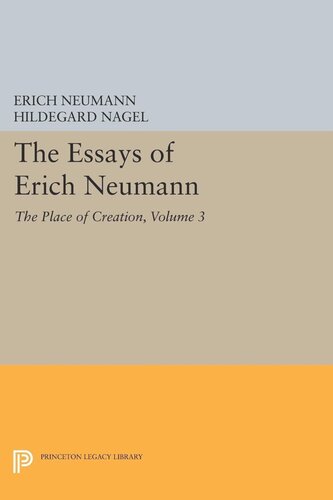

Most ebook files are in PDF format, so you can easily read them using various software such as Foxit Reader or directly on the Google Chrome browser.
Some ebook files are released by publishers in other formats such as .awz, .mobi, .epub, .fb2, etc. You may need to install specific software to read these formats on mobile/PC, such as Calibre.
Please read the tutorial at this link: https://ebookbell.com/faq
We offer FREE conversion to the popular formats you request; however, this may take some time. Therefore, right after payment, please email us, and we will try to provide the service as quickly as possible.
For some exceptional file formats or broken links (if any), please refrain from opening any disputes. Instead, email us first, and we will try to assist within a maximum of 6 hours.
EbookBell Team

4.0
76 reviewsThe Israeli analytical psychologist Erich Neumann, whom C. G. Jung regarded as one of his most gifted students, devoted much of his later writing to the theme of creativity. This is the third volume of Neumann's essays on that subject. Neumann found his examples not only in the work of writers and artists--William Blake, Goethe, Rilke, Kafka, Klee, Chagall, Picasso, Trakl--but as well in that of physicists, biologists, psychiatrists, and philosophers. Confronting the problem of portraying men and women as creative beings, Neumann expanded the concepts of Jungian psychology with a more comprehensive definition of the archetype and a new concept--"unitary reality." Whether or not humanity can be restored to health from its present situation as a self-endangered species depends, according to Neumann, on whether we can experience ourselves as truly creative, in touch with our own being and the world's being. The six essays comprising this volume--"The Psyche and the Transformation of the Reality Planes," "The Experience of the Unitary Reality," "Creative Man and the `Great Experience,'" "Man and Meaning," "Peace as the Symbol of Life," and "The Psyche as the Place of Creation"--all originated as lectures at the Eranos Conferences in the years 1952 to 1960.
Originally published in 1989.
The Princeton Legacy Library uses the latest print-on-demand technology to again make available previously out-of-print books from the distinguished backlist of Princeton University Press. These editions preserve the original texts of these important books while presenting them in durable paperback and hardcover editions. The goal of the Princeton Legacy Library is to vastly increase access to the rich scholarly heritage found in the thousands of books published by Princeton University Press since its founding in 1905.